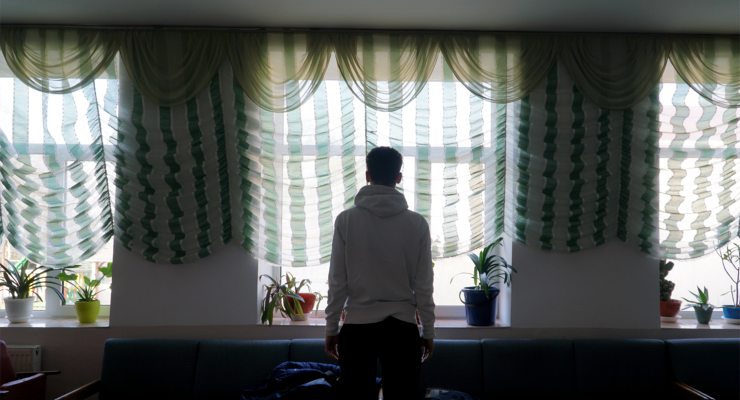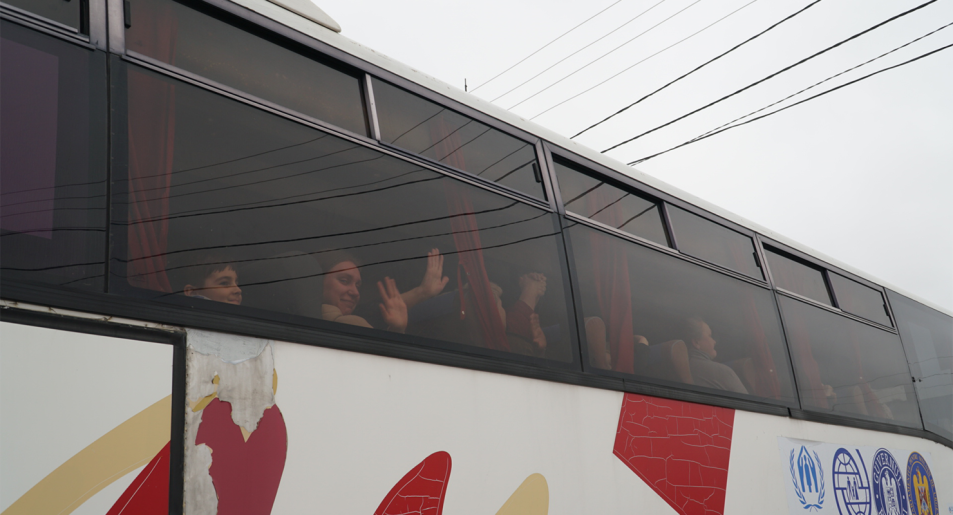
There was only one seat available on the bus out of Russian-occupied Kherson in southern Ukraine. Dmitro’s mother insisted he take it — forcing him to leave her and his seven-year-old sister behind. Just 17 years old, Dmitro arrived in Moldova on Saturday morning alone as an unaccompanied minor. He talked to Crikey just hours after making it to safety, supported by UNICEF volunteers.
“[My mother and sister] want to leave, but it’s very difficult … the Russians check people at posts and don’t allow people to leave,” Dmitro said.
On Friday, Ukrainian officials in the eastern Luhansk and Donetsk regions urged residents to evacuate as Russia repositioned itself. It is expected attacks will intensify as Russia prepares to take the east, with water and electricity cut off in many cities.
Ukraine’s deputy prime minister Iryna Vereshchuk estimated nearly 6700 Ukrainians have been evacuated from Russian-occupied territories since then, through humanitarian corridors negotiated between the two countries, with the deal mediated by the Red Cross. But leaving is difficult — and not everyone feels safe doing so.
Stuck in Kherson
Dmitro is tall, with an athletic build — he plays soccer, and hopes to study at a German university and join the soccer team. “Please don’t judge me because I started smoking,” he said. “I hear it can help with stress.” He spoke to me from what used to be a home for children with disabilities.
Since the war broke out in late February, it’s been converted into a refugee centre, housing Ukrainians in dorm-style rooms with bunk beds for as long as they need.
The centre is located in Căușeni in southern Moldova in a farming village surrounded by simple wood-and-cinderblock houses. There’s a well outside the front of the property, where locals draw mineral water for their homes.
For the first time in weeks, spring sun filters through the windows in a common room in the centre — the only spot where wi-fi is available. Two other teens lay on couches, playing games and watching videos on their phones.
Kherson has been occupied for more than a month by Russia following a six-day siege. Much of the city has been reduced to rubble, with Ukrainian soldiers fighting back to regain territory.
It’s not safe either: many Kherson locals have lost their lives. Dmitro knows some of these people — one, he said, was shot while talking on the phone because Russian soldiers thought he was filming, which is prohibited.
“More than half the population is now Russian soldiers,” he said.
Dmitro said he was able to get out safely and wasn’t afraid. Someone they knew has an arrangement with the Russians — he doesn’t know the details of it but suspects the driver has a pass showing he’s carrying essential supplies and is able to get Ukrainians out to Odessa. There was just one seat on the bus available — the driver is making multiple trips, but spots in his car are booked out for the next month. “My mum said, ‘This is your unique chance to leave,’ so we just made the decision.”

Dmitro is just two months shy of turning 18. Ukrainian men of fighting age aren’t permitted to leave the country, meaning he had just a small window of opportunity.
So on Thursday morning, he climbed onto the bus, leaving his family behind. He spent two nights in Odessa at the house of one of his mother’s friends to abide by the night curfew before taking a bus organised by the Ukrainian government into Moldova.
But Dmitro is now stuck: he has a passport but needs a power of attorney from his mother to continue travelling to meet distant relatives in Germany. He’s being assisted by UNICEF psychologists and staff to get him there.
A difficult decision
Dotted across the bottom rows of bunk beds in the same centre as Dmitro sit Shanima, Ana, Tatiana and Viridiana — a family of women spanning two generations. They fled Mykolaiv, a city on the coast just 50 kilometres from Odessa. The city has been under near-constant bombardment for weeks, with civilian areas under relentless attack. Russia has been trying to seize it to continue its advance into Odessa and occupation of Kherson, the closest city to the West.
The women were able to board a bus and make their way to Moldova on Wednesday, April 6, but it was a difficult decision to leave. They had been staying together at a smaller house on the outskirts of the city where they thought they would be safer. But when they left the bunker one morning, they found weaponry outside their house and knew civilian areas weren’t safe. Much of their family remains — as do their small farms and cats.
The turning point for Ana was when a close family friend was killed in an airstrike. “We packed up and were able to go in 20 minutes,” Tatiana said.
Along with the loss of life, the hardest thing for the women to contend with is how destroyed the city is. They said when the Russians arrived, they began shooting at a decorative tank in the city centre before shooting at supermarkets and civilians. The day they escaped, a children’s hospital was reportedly struck by a Russian missile.
“We were so proud about how the city had developed — there were new transport systems, hospitals were renovated. It was a pleasure to live there — and now everything is destroyed. I have no clue how it will be rebuilt,” Ana says.
I asked if she planned on returning to Mykolaiv. “How dare you,” she said. “That’s my home. I want to go home.”
Returning home, regardless of safety
But not everyone is planning to leave — after an attack on a train station in Kramatorsk killed at least 52 people, many have decided to stay at their homes, running to bunkers at the sound of air-raid sirens.
Some Ukrainians are even returning home. “My plants are dying and there’s no life for me here,” one woman said in Medyka in Poland as she crossed back over.
On Saturday morning, a line of around 12 cars appeared at the Palanca border crossing within 15 minutes of each other. Most had Ukrainian number plates, with bags piled high in the back. Some are trying to get home to pick up pets, relatives or extra belongings; others are planning to return home permanently.
Sitting in the passenger seat of her car with her husband driving and two young girls in the back, Kristina said the family is returning to Odessa, even as others flee.
“We are afraid, but we want to go home,” she said.
*Surnames withheld for privacy.








Surely a decision that no mother should have to make.
Thank you Amber for your reporting. The almost prosaic, but human, facts of the reality as you tell it poignantly reveal the chaotic horror of it all. Excellent, but depressing stuff.
ONE MAN . . . excerts his individual ‘will’ upon the known world. Thousands upon thousands of lives cease to exist. Homes, communities, whole cities infrastructure now rubble. ONE MAN!
Thousands upon thousands of lives cease to exist. TICK!
Homes, communities, whole cities infrastructure now rubble. TICK!
Hmmm . . . So it must be? ONE MAN excerts his will ‘upon the known world’ . . . that is the fallacy? Oh Oh!! There must be known, unknowns running The Kremlin and, and, Putin . . . ‘a mere scape-goat’. Wow!
Wait a minute . . . who actually is ordering public rest and recreational revivalism for all the committed Muscovites gathering in public squares to express their joy that their armies are working so hard to create more open recreational spaces for Ukraine cities and communities?